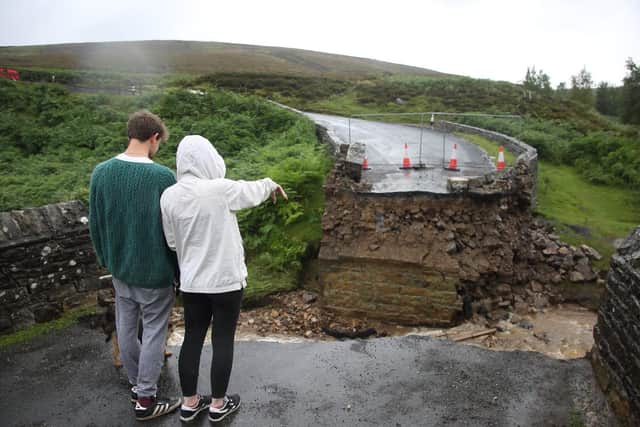'Storms Ciara and Dennis show why we need a fresh approach to managing North's great rivers'
In the wake of storms Ciara and Dennis causing hundreds of thousands of pounds of damage across England’s largest county, North Yorkshire County Council said it was pressing the Environment Agency to oversee concerted, pro-active action to deal with rivers such as the Ure, Swale, Wharfe, Nidd, Ouse, Esk and Derwent.
Days before the authority publishes its investigation into flooding in the Yorkshire Dales last July, a meeting of its executive heard the storms of recent weeks had triggered a huge effort from an army of public sector workers, with some officers having travelling up to 80 miles more to reach marooned residents due to closed roads and diversions.
Advertisement
Hide AdAdvertisement
Hide AdThe authority’s leader, Councillor Carl Les, said: “The worrying thing is that these once in a hundred years occurrences are happening on a much more frequent basis, so we have to anticipate there are going to be more storms like Storm Ciara and Storm Dennis coming our way, so we have to think about how we can prepare ourselves for the future.”


He said local authorities, government agencies and landowners needed to join forces to tackle the issue.
Coun Les said: “If we have to divert flows to stop them hitting centres of population, then landowners have to be playing their part and we have to be compensating them for managing that flow of water before it does damage further downstream.
"Then we need to make sure we have adequate flood prevention measures in place to keep the water in the river rather than getting into people’s houses.
Advertisement
Hide AdAdvertisement
Hide Ad“I understand [Environment Secretary George Eustice] has announced he now wants a Yorkshire summit and he wants to have similar conversations himself. I look forward to us being able to play our part in those discussions going forward.”
The report into last July’s flooding in the Upper Dales settlements of Leyburn, Bellerby, Reeth, Fremington, Arkengarthdale, Grinton and Middleham states the equivalent of the typical average rainfall expected in July fell in just two hours, with a return period in excess of 1,000 years.
It states as there were 513 incidents of flooding to property and places at 238 locations received during the event there was “insufficient time to mobilise a co-ordinated multi-agency response”.
The report recommends the council and the Environment Agency supports work to investigate developing technologies in short-term forecasting, and surface water risk warning, with the aim of improving forecasting of intense, localised storms.
Advertisement
Hide AdAdvertisement
Hide AdIt also calls on the county council and parish councils to examine the condition of infrastructure near rivers, and model the consequences of blockages to shape a maintenance programme as well as identifying opportunities to hold back water from entering rivers during extreme rainfall.
The recommendations also include working with communities and land owners to implement natural measures of reducing flood risk from surface water run-off and examine the potential for property level resilience in areas where multiple properties are at risk from repeated events.
The council’s chief executive Richard Flinton told the executive meeting it was holding talks with the Environment Agency about how each of the rivers could be strategically managed. He said a steering group across catchment areas was needed to get a better grip on the issue, particularly given the greater prevalence of floods and given climate change as a major concern.
He said more effective partnerships were needed on each of the river catchments to look at investment, flood planning, sufficiency at times of drought and quality of water in terms of habitat management.
Advertisement
Hide AdAdvertisement
Hide AdMr Flinton said: “We have partnerships that do a good job but do we need to beef them up so they are more effective. We really are hoping that the Environment Agency will engage productively with us and look at new approaches because we can’t carry on doing the same old issues. We need a new approach to ensure we have new policies and methods of investment to deal with this.”
